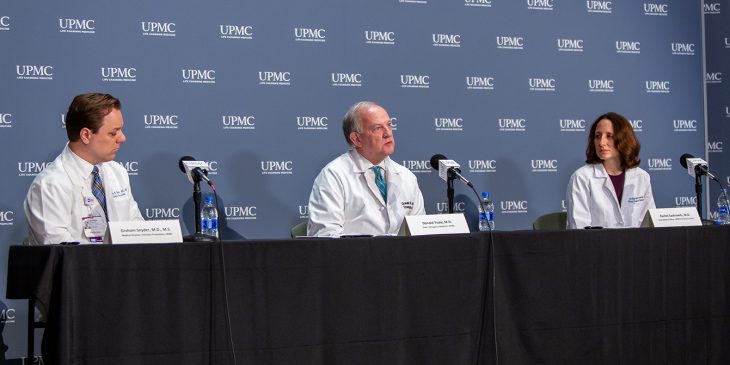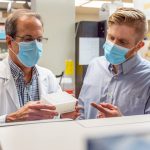UPMC’s latest diagnostic testing and community surveillance research testing reveal that COVID-19 is here, but still not widespread. Out of 2,000 tests performed in the community surveillance study since mid-February through Thursday, nine have been positive, a rate of less than 1%.
Dr. Graham Snyder, medical director of infection prevention and hospital epidemiology at UPMC, said that UPMC has performed 1,743 tests across the system and 141 have been positive. That’s a positive rate of 8%.
This means UPMC and public health authorities still find value in identifying and tracing positive cases to help stem the spread, Snyder noted. This data also show that containment efforts like social distancing should continue.
One way UPMC is encouraging these behaviors is by rapidly expanding the availability of video visits for both scheduled and urgent-care visits, through MyUPMC and UPMC AnywhereCare. In just two days last week, UPMC did as many telemedicine visits as in all of 2019.
“UPMC providers are ready to see patients virtually, for urgent care or non-urgent care,” said Dr. Donald Yealy, chair of emergency medicine at UPMC. “Video visits help keep patients and providers safe while allowing hospitals to have more critical protective equipment when COVID-19 infected people need care at a hospital.”
UPMC is committed to keeping all staff safe while caring for patients. “We are not short on personal protective equipment,” Yealy stated. “Any employee who cannot find the protective equipment they need has the ability to talk with a supervisor. There is no need for anybody to be going without proper masks, gowns and gloves.”
On March 26, UPMC began screening all staff, visitors and patients for COVID-19 symptoms and exposure before entering any UPMC hospital or cancer center. Anyone who is permitted to enter one of these facilities is given a mask for protection.
 Dr. Rachel Sackrowitz, chief medical officer of the UPMC Intensive Care Unit (ICU) Service Center, highlighted UPMC’s extensive in-hospital and ICU preparations across its 5,500-bed, 40-hospital system.
Dr. Rachel Sackrowitz, chief medical officer of the UPMC Intensive Care Unit (ICU) Service Center, highlighted UPMC’s extensive in-hospital and ICU preparations across its 5,500-bed, 40-hospital system.
Critical care specialists are using telemedicine to connect with providers who may be hundreds of miles away. “This is called ‘tele-ICU’ and is breaking down barriers in providing the very highest level of care to more patients,” said Sackrowitz.
By next week, physicians at every UPMC hospital will be able to consult with infectious disease experts through ID Connect, a company created by UPMC experts that allows infectious disease physicians to provide consultations to clinicians via telemedicine.
“We are preparing for a surge that we hope never arrives,” Yealy said. “We are also ready for all the other health care needed, notably emergency and medically necessary care. We will continue to serve our community and do so safely.”
UPMC will be regularly updating the community on this developing situation. Follow UPMC News for updates.








